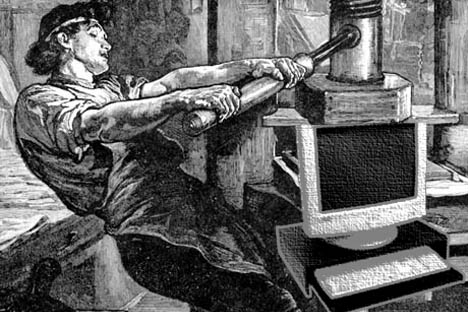I remember a fascinating article. Three years ago, a legendary magazine editor tracked down 10 professional authors, and asked them a simple question: “Is the net good for writers?”
“Over a billion people can deliver their text to a very broad public,” he wrote at the time — but how does it affect those people who actually sell their writing for a living? “Writing as a special talent became obsolete in the 19th century,” one writer had told him in 2002. “The bottleneck was publishing…”
With the popularity of the Kindle, it’s an even better question, since writers are not just competing with the internet, but with the self-published ebooks of amateurs. Author Erik Davis (also a writer for Wired, Bookforum, and The Village Voice) had remembered that in the mid-90s, “I got paid pretty good for a youngster — generally much better than I get paid now, when my career sometimes looks more and more like a hobby…” But he also noted that his career is “less driven by external measures of what a ‘successful’ writing career looks like,” and he’d enjoyed spending his time writing about off-beat topics like mystical and counter-cultural threads in both technology and the media.
But he also thinks technology is changing the kinds of things we end up reading, creating a bigger demand for smaller articles — and a much bigger market for “opinion”. And author Mark Dery, author of Cyberculture at the End of the Century, also seemed to agree about the shorter article sizes, complaining that today, “information overload and time famine encourage a sort of flat, depthless style, indebted to online blurblets, that’s spreading like kudzu across the landscape of American prose.” Yes, things are more democratic now, Dery believes, but that’s brought good changes as well as bad.
“Skimming reader comments on Amazon, I never cease to be amazed by the arcane expertise lurking in the crowd; somebody, somewhere, knows everything about something, no matter how mind-twistingly obscure. But this sea change — and it’s an extraordinary one — is counterbalanced by the unhappy fact that off-the-shelf blogware and the comment thread make everyone a critic or, more accurately, make everyone think they’re a critic, to a minus effect.
We’re drowning in yak, and it’s getting harder and harder to hear the insightful voices through all the media cacophony. Oscar Wilde would be just another forlorn blogger out on the media asteroid belt in our day, constantly checking his SiteMeter’s Average Hits Per Day and Average Visit Length.”
Dery’s ultimate conclusion? In these complicated and chaotic times, “the future of writing and reading is deeply uncertain.” And some of his thoughts were echoed by Adam Parfrey, the publisher at Feral House books (and the author of Apocalypse Culture). “I like the internet and computers for their ability to make writers of nearly everyone,” Parfrey writes. “I don’t like the internet and computers for their ability to make sloppy and thoughtless writers of nearly everyone.”
But at the end of the day, Parfrey seems to reach a more positive view. “Overall, it’s an exciting world,” he writes. “I’m glad to be alive at this time.”
If I could, I’d print out the article and send it in a time capsule to the year 2110 — since each author had an interesting but subtly different perspective. Douglas Rushkoff wrote that “The book industry isn’t what it used to be, but I don’t blame that on the internet. It’s really the fault of media conglomeration. Authors are no longer respected in the same way, books are treated more like magazines with firm expiration dates, and writers who simply write really well don’t get deals as quickly as disgraced celebrities or get-rich-quick gurus…”
And John Shirley, author of The Eclipse Trilogy, noted that in today’s book publishing industry, “Editors are no longer permitted to make decisions on their own. They must consult marketing departments before buying a book. Book production has become ever more like television production: subordinate to trendiness, and the anxiety of executives.”
But Shirley also added that “in my opinion this is partly because a generation intellectually concussed by the impact of the internet and other hyperactive, attention-deficit media, is assumed, probably rightly, to want superficial reading.” And he wasn’t the only author who had unkind thoughts for technology itself. Michael Simmons, a former editor for The National Lampoon, wrote “We’re a planet of marks getting our bank accounts skimmed by Bill Gates and Steven Jobs… Furthermore, I get nauseous thinking of the days, weeks, months I’ve spent on the phone with tech support.”
It’s one of the meatiest articles I’ve ever read about writing, publishing, and the state of the modern author. But having said that, I still thought that Edward Champion had perhaps the ultimate comeback.
“If the internet was committing some kind of cultural genocide for any piece of writing that was over twenty pages, why then has the number of books published increased over the past fifteen years?”

I really enjoyed this post, very insightful!
I thought this was dead-on:
“Authors are no longer respected in the same way, books are treated more like magazines with firm expiration dates, and writers who simply write really well don’t get deals as quickly as disgraced celebrities or get-rich-quick gurus…”
Sad but true.